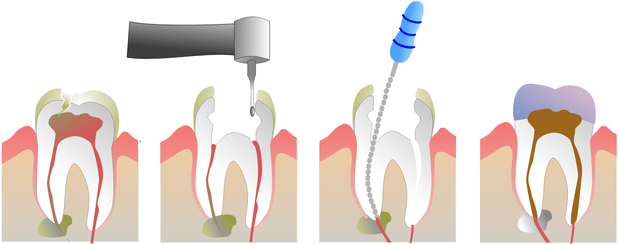Root Canals in Ephrata, PA
Understanding Root Canals
A root canal procedure is an essential treatment that can save a tooth – and your smile. Root canals stop infections, abscesses in your jaw, and bone loss. And because of advancements in dental practices and technology, root canals are quick and easy, with a minimum amount of discomfort.
At Larrimore Family Dentistry, our compassionate staff will answer your questions alleviate any concerns you might have. We will make sure your entire root canal procedure is quick and painless, so you can continue enjoying a healthy and bright smile.
Why Would I Need a Root Canal?
Beneath the hard exterior enamel of a tooth is a soft tissue core. Extending all the way to the roots of the tooth, this tissue contains pulp, nerves, and blood vessels. When this pulp is inflamed or infected – often by an injury or deep cavity – it causes pain and severe discomfort. This infection can travel through the pulp to the tooth’s root, causing an abscess in your jaw.
A root canal clears the tooth of infection by removing the soft pulp core. This allows the dentist to treat an abscess before the infection spreads, leading to more serious issues. A root canal procedure is a preferred option over extracting, since your tooth remains and works normally once capped.

What Are Some Common Symptoms to Indicate an Infected Pulp?
There are several symptoms that indicate an infection or deeper problem inside the tooth. The most common treatment for these issues is a root canal. Symptoms include:
- Severe tooth pain when you bite down
- Temperature sensitivity, with pain remaining after the source is removed
- Discoloration of the tooth
- Swollen gums that are tender to the touch
If you notice any of these symptoms on a regular basis, call us at 717-733-7971 or use the form on this page to schedule an appointment.
What Steps Are Involved in a Root Canal Procedure?
First, local anesthetics are applied to numb the tooth and surrounding area. Next, a hole is drilled into the surface of the tooth, creating an opening through which the dentist can access the pulp and root canal. The dentist will then remove the pulp and disinfect the inside surfaces of the tooth. Once cleaned, the tooth is filled with a rubber-like filling called gutta-percha. If necessary, a rod may be placed inside to support the filling and the new crown. Finally, a crown or protective filling is installed to cap the tooth. Once the root canal is finished, your tooth is as good as new; it might be a little sensitive the first few days, but you can use it to chew as usual.
How Long Does a Root Canal Take?
The root canal procedure has advanced over the last few decades, resulting in a shorter procedure and more-durable finish. What once took several visits can now be done in an hour or less. Depending on the severity of the infection and the condition of the tooth, we may divide the root canal into two treatments; the first treatment will clean and disinfect the tooth, leaving the filling and crown to the second treatment.
Is a Root Canal Painful?
With the development of better local anesthetics, the root canal procedure has become less painful than it once was. Many of our patients report minimal discomfort during the procedure, similar to a filling.
Contact Us to Schedule an Appointment
If you are feeling significant discomfort or pain in your mouth, call us immediately at (717) 733-7971 for an appointment. We will make sure you get the treatment you need to get your smile looking and feeling great.
